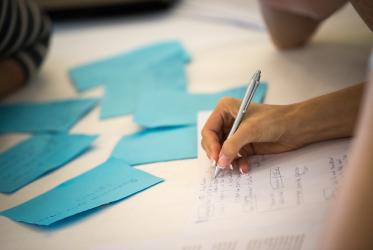Displaying 1 - 20 of 2217
New WCC appointments reflect strong global fellowship
10 April 2024
WCC expresses deep concern for human rights in Haiti
28 March 2024
Bossey interfaith summer course
08 July - 17 August 2024
With deep ties to WCC, The Fig Tree gets ready to celebrate 40 years
29 February 2024
Que peuvent faire les Églises pour prévenir l’esclavage moderne?
26 February 2024
¿Qué pueden hacer las iglesias para prevenir la esclavitud moderna?
26 February 2024
Was können Kirchen unternehmen, um moderne Sklaverei zu verhindern?
26 February 2024
What can churches do to prevent modern slavery?
22 February 2024









